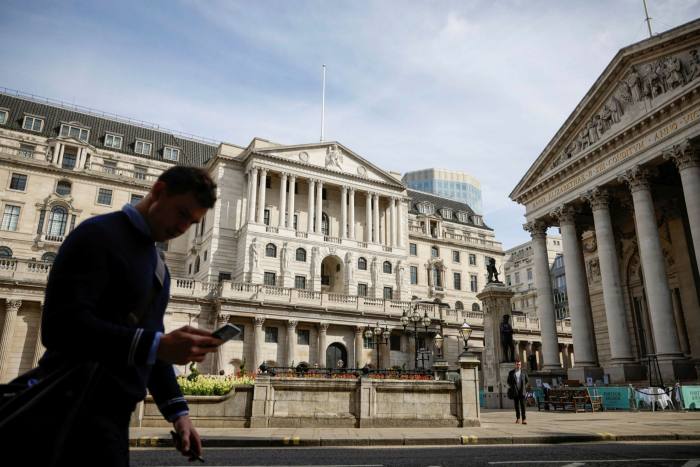It is boom time for new financial services. The value of the world’s cryptocurrencies passed a record $2.4tn this year, while the volume of non-fungible tokens (NFTs) sold in the first half reached more than $2.5bn.
The sale of an NFT representing a digital work by artist Beeple for $69.3m at Christie’s made the headlines in March. Payment cards from challenger banks Monzo and Revolut are now in the wallets of 20m customers. But what people seldom see is the army of legal pioneers working to make these services possible.
Lawyers are having to wrestle with new financial concepts against a setting of old legal frameworks. They are operating in grey areas where regulators are still writing the rules.
“It is not your traditional legal service where you are applying templates created by someone else,” says Natalie Lewis, financial services and markets partner at Travers Smith. “This [is] building it from scratch.” She advised Pay. UK, which runs the UK’s money transfer system, on the design and launch of a “request-to-pay” messaging service that allows businesses and consumers to settle bills quickly and flexibly.
“There were no precedents ,” she says. “It meant sitting down with the business and using lots of whiteboards and diagrams.”
Often, lawyers are trying to ensure that emerging services are not throttled by regulation. When Lisbon law firm Abreu Advogados was helping to set up Tokapi, Europe’s first fully regulated NFT marketplace, a crucial issue was understanding whether an NFT could be classed as a security — a tradeable financial asset — or not.
NFTs are often used to trade and collect digital art and digital sport memorabilia. Their value can rise and fall and they are traded much like stocks — even though many see them as a collectible, similar to a classic car or rare wine.
If NFTs were seen as a security, Tokapi would have to have been licensed as a financial intermediary, in an extra complication for the start-up. The Bank of Portugal has not ruled on the issue but Diogo Duarte, co-head of banking and finance at Abreu Advogados, made the case that NFTs were not securities as there was no promise that a buyer would profit and no management of the trading of the NFTs: “I feel pretty comfortable [with the] conclusion that, if you don’t promise capital gains and if you don’t promise to manage the trading of these markets, NFTs don’t qualify.”
Similarly, when Société Générale issued the first structured product as a security token on a public blockchain, there was ambiguity over custody of the securities and regarding who holds the money in case anything goes wrong.
Matthieu Lucchesi, innovation and fintech attorney at Gide Loyrette Nouel, assisted with this by making it clear that Société Générale was providing custody as a technical service and, as such, would not need additional authorisation.
It helped that Lucchesi had worked at the French financial authority. “We have a very good understanding of how these discussions work and the timeframes,” he says.
Lawyers try to give their fintech customers breathing space from overregulation, but they need to protect consumers.
Legal headaches connected with decentralised finance are already emerging, such as the losses incurred by traders when cryptocurrency exchange Binance had an outage in May. The traders are struggling to bring a lawsuit because the company has no headquarters and is not registered or regulated in any jurisdiction.
Another question is what would happen if a company whose servers host an NFT artwork suffers a catastrophic technical failure, or goes out of business.
“Sometimes, entrepreneurs don’t really understand the legal implications,” says Duarte — or that, in creating an NFT, you are offering permanent assurance of the link between the blockchain reference and the digital asset. “You need to have proper contingency plans, recovery plans to ensure that even if a server is damaged the NFT is not lost,” he says.
Copyright is another problem. Buying an NFT-based artwork does not automatically give the buyer the copyright, unless this is specified, meaning the NFT owner may not be allowed to distribute or commercialise it. And just because a piece of digital art is on the blockchain, there is no guarantee that it is not a copy of someone else’s work and therefore worthless.
Many legal questions are still outstanding regarding decentralised finance, such as cross-border provision of settlement services, says Lewis: “We still need to come up with an international system to decide which law applies to new-generation fintech assets.” This includes deciding where an asset is located — something conflict-of-law rules often refer to.
Given the complexities involved, he says, it could take years to reach international consensus, but the fact that it appears to be top of the agenda for governments and regulators is “both promising and exciting”.
Other matters being discussed are which kind of exchanges blockchain-based assets can be traded on, and how to tax them. Pioneering lawyers will first help regulators set the case law and then spend the next decade testing it.
Case studies in best practice
Researched, compiled and ranked by RSGi. ‘Winner’ indicates the organisation won an FT Innovative Lawyers 2021 award
Case studies: Moving the market forward

Lawyers have been turning a period of economic uncertainty into an opportunity for progress
WINNER: Travers Smith
To prepare for Brexit, the firm helped lawyers at the securities depository Euroclear design a system ensuring a backstop for the euro settlement of securities. With more than £1tn worth of securities settled using Euroclear’s Crest system daily, putting in place facilities to prevent any disruption was essential. Lawyers secured approval from the Bank of England and regulators, agreed contractual agreements with Crest members, and enabled the introduction of the technical model needed to access central bank money.
Cadwalader, Wickersham & Taft
Lawyers worked with the bank Investec to launch a €1bn secured note programme with a UK insurer. By agreeing with the rating agency Moody’s to give the notes a capital rating, lawyers enabled investing insurers to access returns of around 1.5-2 per cent — higher than they could access before. By using an Irish special purpose vehicle, insurers can access this credit exposure without compromising on the matching adjustment they are required to demonstrate to regulators.
Gide Loyrette Nouel
Société Générale Forge is a new entity set up by the French investment bank to manage investing and issuance of financial products involving digital assets. The capital markets team at law firm Gide Loyrette Nouel and members of Gide 255, the firm’s client innovation team, advised Forge on the legal framework for Europe’s first issuance of a structured debt product on the public blockchain platform, Tezos, in April 2021.
White & Case
After securing the first special purpose acquisition company (Spac) in France in 2016, last year the firm advised a syndicate of banks on the public offering of 2MX Organic. Unlike the first French Spac, which required shareholder approval, this replicates the model used in the US that requires approval from the board but not shareholders, and gives investors the right to redeem their shares after an acquisition is made. This allows Spac deals to happen faster, with more flexibility. It was the largest public offering on the Paris market in 2020.
Bird & Bird
Oxygy, the law firm’s consulting arm, worked with construction and property company Lendlease to support the creation of Federated Innovation, an ecosystem in Milan designed to foster new ideas. The initiative gathered 34 companies to work on projects to help the city recover from the pandemic and become more environmentally sustainable. The law firm and Oxygy worked on the governance framework and intellectual property policies and devised an innovation process to give structure to the projects.
Hogan Lovells
Lawyers in the firm’s Moscow office assisted Netflix in launching a Russian version of its streaming service, setting up a joint venture with Russian media company National Media Group to comply with laws preventing majority foreign shareholders of media companies, and negotiating regulations. This creates opportunities for Russian filmmakers and gives local audiences access to Netlix’s foreign content with Russian subtitles. Netflix estimates it will have more than 1m Russian subscribers by the end of 2021. Commended: Natalia Gulyaeva.
Vieira de Almeida
The firm helped the investment fund BlueCrow give companies in Portugal access to a tax incentive bill. The lawyers secured an arrangement in which any company can receive a tax break for investing money into funds financing research and development or new start-ups — enabling them to potentially recoup their losses, or even make a profit. The firm worked with BlueCrow to set up the first fund of this kind and lobbied the government to secure legal approval.
Abreu Advogados
The firm advised a group of entrepreneurs on the launch of a non-fungible token (NFT) marketplace called Tokapi, helping the business overcome complications in registering with Portugal’s central bank because these virtual assets are held on blockchain. The lawyers addressed questions on VAT rules in Europe, advising the entrepreneurs on adapting their business model to make the tax structure simpler.
Covington & Burling
The digital health team combines experts in regulation, data and privacy, intellectual property, government affairs and competition law to advise digital healthcare clients. One such client is clinical artificial intelligence company Sensyne Health, which acts as an interface between doctors and patients on the one hand, and pharmaceutical companies on the other, analysing data to recommend where investment should be made.
Credit: Source link




















